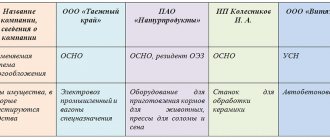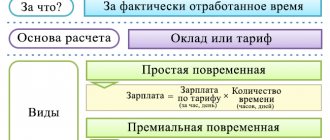What does the Labor Code of the Russian Federation say about the timing of payment of wages in 2022?
Salary terms are fixed in Art. 136 Labor Code of the Russian Federation. According to it, money for employees’ work should be transferred to:
- at least every half month; And
- no later than 15 calendar days from the end of the period for which the payment was accrued.
If the salary date approved by the employer falls on a weekend, the money is issued the day before.
Please note that Rostrud requires that a payslip be issued to the employee with each payment, that is, if the salary is issued 2 times a month, then there should be two payslips.
IMPORTANT! Norms Art. 136 of the Labor Code of the Russian Federation are mandatory and cannot be violated even at the written request of an employee who wishes to receive money once a month.
As a rule, employers pay wages according to the following scheme: once a month they issue an advance and once a month the final payment, adjusted to the previously issued advance. With such a schedule and taking into account the norms of Art. 136 of the Labor Code of the Russian Federation, the deadlines for salaries for the first half of the month fall on the 16th–30th (31st), and for the second half - on the 1st–15th.
IMPORTANT! For large companies with a large number of structural divisions and a large staff, it is not prohibited to approve different salary payment dates for different departments (letter of Rostrud dated June 20, 2014 No. PG/6310-6-1).
All aspects of paying advances to new employees are in the article “Advance to a new employee in the first month of work.”
Mandatory advance payment
The obligation to pay an advance on wages is indicated by Art.
136 Labor Code of the Russian Federation. According to its provisions, wages must be paid at least every half month. Thus, paying wages once a month is a violation of labor laws. Administrative liability is provided for violation of labor legislation.
It should be borne in mind that the employee’s statement of consent to receive wages once a month does not relieve the employer from liability. Rostrud specialists draw attention to this in Letter No. 472-6-0 dated 03/01/2007.
Provisions of Art. 136 of the Labor Code of the Russian Federation are imperative, that is, mandatory for execution. Labor legislation does not provide for any exceptions to the established rule. It does not matter where a person works: at his main place or part-time. Thus, in relation to part-time workers, the employer is also obliged to pay wages in two parts: advance and payment (Letter of Rostrud dated November 30, 2009 No. 3528-6-1).
What documents indicate the days of payment of wages?
The employer is obliged to fix a specific schedule for the transfer of salary money in its local regulations (LNA): internal labor regulations (ILR), collective or labor agreement. It is these 3 documents that Art. 136 Labor Code of the Russian Federation.
The wording of this article is designed in such a way that the question often arises: is it necessary to fix salary terms in all of the above documents or is one of them sufficient? The answer to it was repeatedly given by both officials and judges (letter of Rostrud dated March 6, 2012 No. PG/1004-6-1, ruling of the Moscow City Court dated December 24, 2012 No. 4g/5-12211/12).
For information on what to include in an employment contract, read the article “Procedure for concluding an employment contract (nuances).”
According to the explanations, it is enough that the deadlines are fixed in one of those given in Art. 136 Labor Code of the Russian Federation documents. Moreover, according to Rostrud, PVTR is a priority. He explains this by saying that the PVTR is a general document, the norms of which apply to all personnel, while an employment contract regulates relations with a specific employee, and a collective agreement may not be concluded at all.
In order to completely eliminate disputes with inspectors, you can do the following: fix the rules for issuing wages in the PVTR, and add a phrase in labor or collective agreements that refers to the PVTR: “salaries are issued in accordance with clause (here we indicate the clause number of the PVTR) of the rules labor regulations..."
Want another expert opinion? Sign up for a free trial of ConsultantPlus or, if available, proceed to the Salary Guide.
What to consider when setting payroll dates
Before approving salary dates, consider the possible risks and tax consequences. There are a number of slippery points that you should pay attention to:
- The expressions “every half month” and “twice a month” should not be confused. For example, the numbers 3 and 16 fit the definition of “twice a month,” but the rule of not exceeding a gap of 15 days is not followed here, since from the 16th to the 3rd it is more than half a month.
- It is dangerous to choose not clear dates, but a time period - for example, from the 1st to the 5th, as well as deadlines, for example, no later than the 5th and 25th. Firstly, Art. 136 of the Labor Code of the Russian Federation speaks of the need to establish specific dates, and secondly, there is a risk of confusion and exceeding the six-month interval between payments. The illegality of this approach is stated in the letter of the Ministry of Labor of the Russian Federation dated November 28, 2013 No. 14-2-242, the resolution of the Supreme Court of the Russian Federation dated May 15, 2014 No. 3-AD14-1, the ruling of the Trans-Baikal Regional Court dated September 5, 2012 No. 33-2867-2012.
- An insufficiently defined phrase will also be unsafe, for example: “salaries are paid no later than the 5th and 20th of each month.” After all, it is impossible to understand from such a phrase when an advance is given and when the final amount is given.
- When choosing convenient dates, you need to take into account the requirements of the Tax Code of the Russian Federation. Thus, the 15th day for the final payment turns out to be inconvenient, since the advance payment in this case falls on the 30th day, and this is the last day in many months. From the advance paid on the last day of the month, personal income tax will have to be withheld (clause 2 of Article 223 of the Tax Code of the Russian Federation, determination of the Supreme Court of the Russian Federation dated May 11, 2016 No. 309-KG16-1804). But in months that have 31 days, this is not necessary. This will create confusion for both the accountant and controllers.
To learn how to reflect the tax withholding date in 6-NDFL, read this article.
Is it permissible to pay salaries more than twice a month?
Yes, definitely. The Labor Code directly states that salaries are paid “at least every half month.” This means that restrictions are placed only on rarer payments to employees, but not on more frequent ones (letters from the Ministry of Labor of the Russian Federation dated 02/03/2016 No. 14-1/10/B-660, dated 12/06/2016 No. 14-1/B-1226 ).
If you wish, you can issue money not twice a month, but weekly and even daily. However, before switching to a more frequent frequency of salary payments, it is worth considering the feasibility of this: whether such a schedule will be convenient and beneficial for both employees and the employer himself.
Practice shows that this is beneficial for those employers who employ temporary staff; in other cases, the benefits of more frequent payment of money are completely unobvious, if not completely absent.
For information on how to conclude an agreement with a temporary worker, read the material “Art. 59 of the Labor Code of the Russian Federation: questions and answers.”
The weekly payment does not excite the staff either: according to repeated statistical surveys, the majority of employees would like to maintain a 2-time salary schedule.
Setting the advance amount
Often the amount of the advance is set at a certain integer, constant value.
Moreover, for some, this value is approximately 40% of the total salary for the month, for others - 30%, etc. According to the author, since the advance is the same salary, only for the first half of the month, it is impossible to formally approach the establishment its size.
Despite the fact that the Labor Code does not regulate the specific amounts of the advance, specialists from Rostrud and the Ministry of Labor note: when determining the amount of wage payment for half a month, the time actually worked by the employee (the work actually performed by him) should be taken into account (letters dated 02/03/2016 No. 14-1/ 10/B-660, dated 09/08/2006 No. 1557-6).
Thus, with the advance method of calculating wages for each half of the month, wages should be accrued in approximately equal amounts (Letter of the Ministry of Health and Social Development of the Russian Federation dated February 25, 2009 No. 22-2-709).
Based on the above, the advance payment should be set in the amount of wages accrued for the days worked in the first half of the month based on the submitted time sheet. Since the amount of wages varies from month to month, the amount of the advance cannot be a constant, round amount.
Is it legal to pay wages ahead of schedule?
It is only legal if the payday falls on a weekend. In other cases, despite the fact that there is no violation of the rights of employees, it is not recommended to pay money earlier than approved by the employer’s LNA. This is fraught with claims from the labor inspectorate and the imposition of a fine.
As we have already found out, the Labor Code of the Russian Federation requires that the dates of payment of wages be clearly recorded in the employer’s LNA. By paying wages ahead of the approved date, strictly speaking, you will have to make appropriate changes to the LNA. However, it is unlikely that anyone will think about a global reworking of documents if the manager occasionally wants to meet employees halfway and issue, for example, a salary before the holidays (while the salary payment period falls on the day after the holiday). In addition, this may lead to an increase in the half-month period between payments, which is also not allowed.
Therefore, although the manager allowed the earlier payment of wages in the interests of the employees themselves, formally this situation is considered a violation (Part 1 of Article 142 of the Labor Code of the Russian Federation) and may lead to fines (Part 1 of Article 5.27 of the Code of Administrative Offenses of the Russian Federation). However, the risk of prosecution here is still small.
Responsibility
It is extremely unprofitable for employers to delay or evade payment of wages. If the management of an enterprise periodically or systematically violates the deadlines for paying wages, then it bears administrative and sometimes even criminal liability for this.
The fines are very high - they can reach half a million rubles, and in particularly serious cases, such violations can lead to imprisonment for up to two years and a ban on holding high positions for a certain period of time.
In addition to the payment of wages, there are a number of mandatory payments that the management of the enterprise must provide to employees in certain cases within strictly defined periods.
- Vacation pay: According to the Law, the employer must pay vacation pay no later than three calendar days before the start of the employee’s vacation. But sometimes employees take urgent leave and then, in order to avoid violations of this part of the law, they should meet their superiors halfway and resort to the following options:
- For the first three days, take time off to account for future unused vacation;
- For the first three days, go on unpaid leave, and after three days, as required by law, go on regular paid leave;
- Take a vacation, as required by law, in three days, but go on vacation when necessary, and then leave the vacation three days before its formal end.
- Sick leave. As the Law states, payment of maternity benefits, as well as sick leave, must be made no later than 10 working days after it reaches the organization’s accounting department. As a rule, accounting departments try not to violate this rule and sick leave is paid on the nearest day of payment of wages.
- Awards. Not always, but quite often, collective and employment agreements stipulate the terms and procedures for paying bonuses. Since bonuses are voluntary for employers, the law does not provide clear instructions on limiting the timing of these payments. However, if in the contract management undertakes to pay bonuses, but for some reason avoids doing so, employees have the right to go to court to protect their rights.
- Business trips. This type of payment can be made in two ways. If an employee receives daily allowances, they must be paid immediately before the business trip in full for the entire period. If travel allowances are calculated based on average earnings during a business trip, then the traveler receives the money in his first salary after the trip.
- Dismissal. According to the law, an employee who has decided to quit and notified his superiors about this in advance must receive settlement funds on the last day of performance of his work duties. Moreover, this amount should include not only payment for days actually worked, but compensation for unused vacation. If the company from which the employee is leaving provided cash bonuses and incentives, the employer has the right to pay them later. More specific deadlines in this case are not specified by law.
Thus, the timing of payment of wages and other payments to employees is strictly and in sufficient detail stipulated in the Law of the Russian Federation. Violation of these deadlines entails the most serious consequences, including administrative and criminal liability. Therefore, it is very important for enterprises to observe labor discipline and the letter of the law.
What are the consequences of violating wage payment deadlines?
The employer's liability for such violations can be of two types: material and administrative.
Administrative liability applies only if the employer is at fault.
Primary administrative punishment (clause 1 of article 5.27 of the Administrative Code):
- warning or fine of 1,000–5,000 rubles. for officials;
- fine for the culprit - individual entrepreneur - 1,000–5,000 rubles;
- fine for the culprit legal entity - 30,000–50,000 rubles.
Repeated administrative punishment (clause 2 of article 5.27 of the Administrative Code):
- disqualification for 1–3 years or a fine of 10,000–20,000 rubles. for officials;
- fine for the culprit - individual entrepreneur - 10,000–20,000 rubles;
- fine for the culprit legal entity - 50,000–70,000 rubles.
Financial liability (Article 236 of the Labor Code of the Russian Federation) is expressed in monetary compensation for each day of delay, calculated from 1/150 of the key rate of the Central Bank of the Russian Federation of the amount due for payment (minus personal income tax). This is the minimum amount of compensation, but the employer has the right to assign a larger amount. No application from the employee is required to receive it - it must be paid along with the delayed amounts.
IMPORTANT! Maternity compensation is paid regardless of whether the employer is to blame for violating salary deadlines.
In what other cases is the employer liable for financial liability? This publication will tell you.
How to make changes to documents and set the correct deadlines for paying wages
If for some reason you do not have LNA regulating the timing of salary transfers, they need to be done as quickly as possible. If the necessary LNAs exist, but the dates in them are indicated incorrectly, this should be promptly corrected:
- If possible, redo the document, but only if doing so will not cause inconsistencies with your other documentation.
- In order to change the collective agreement, assemble a commission of representatives of both parties - employees and employer. Document the results of the negotiations between the commission members in an additional agreement, in which you indicate the new salary terms.
- If salary dates were included in employment contracts, you will have to draw up additional agreements for each of them.
- Changes in the terms of payment of wages included in the PVTR are the easiest to formalize - to do this, it is enough to issue an order, which should be familiarized to each employee against signature.
What such an order looks like can be viewed and downloaded for free using the link below:
How to write an order correctly
Today there is no standard uniform template for all orders on the timing of payment of wages, so employers can write it in any form. In some cases, enterprises use internal document templates approved in the company's accounting policies. But, regardless of which path is chosen, the order must include a number of mandatory information. These include:
- Date of preparation,
- Name of the organization,
- the essence of the order, i.e. exact dates of payment of wages,
- the basis for its writing,
- persons responsible for its execution, indicating their positions and full names.
If any additional papers are attached to the document, they must be noted in a separate paragraph.
Results
The frequency of payment of wages is established by Art. 136 Labor Code of the Russian Federation. It also obliges employers to set clear deadlines for issuing wages in the LNA. Failure to comply with these deadlines (or the absence of regulatory deadlines) falls under the articles of the Labor Code of the Russian Federation and the Code of Administrative Offenses of the Russian Federation on material and administrative liability.
Sources:
- Tax Code of the Russian Federation
- Labor Code of the Russian Federation
- Code of Administrative Offenses of the Russian Federation
You can find more complete information on the topic in ConsultantPlus. Free trial access to the system for 2 days.
What legal acts regulate the timing of salary payments?
The labor rights of citizens are regulated by Chapter 21 of the Labor Code of the Russian Federation.
In particular, the employee has the right to timely receipt of wages (wages) in full in accordance with the conditions of activity (qualifications, complexity of work, volume of work performed).
The procedure for remuneration is prescribed in Art. 136 Labor Code of the Russian Federation. This norm establishes that the employer is obliged to inform the employee regarding the following information:
- what parts does the salary accrued for a specific period consist of?
- amounts of other amounts due to the employee: for example, vacation pay, dismissal payments, etc.;
- the amount of deductions, if any;
- total amount to be received.
The salary is established by the employment contract, which specifies the amount, when the salary will arrive and other conditions (Article 135 of the Labor Code of the Russian Federation).
Liability for delayed wages, partial or complete non-payment is regulated by the provisions of the Labor Code of the Russian Federation, the Code of Administrative Offenses of the Russian Federation and the Criminal Code of the Russian Federation.




